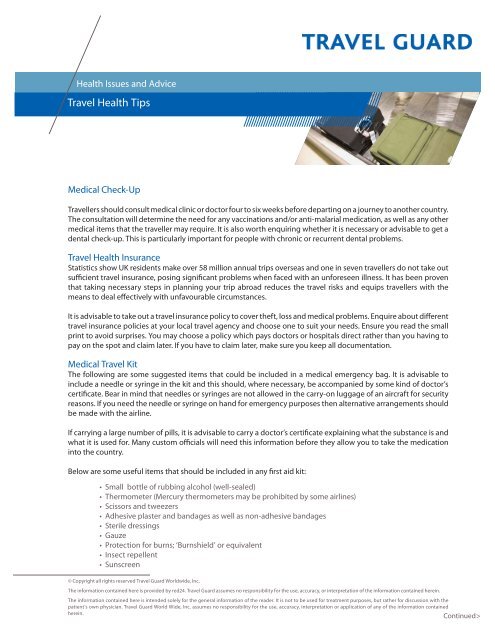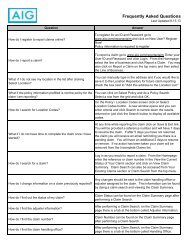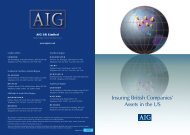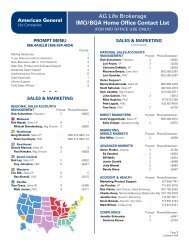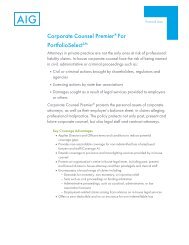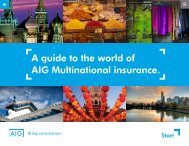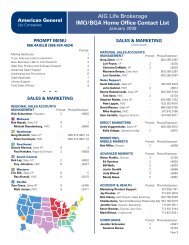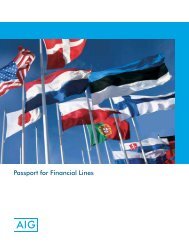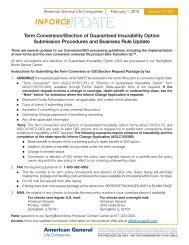Travel Health Tips.indd - AIG.com
Travel Health Tips.indd - AIG.com
Travel Health Tips.indd - AIG.com
Create successful ePaper yourself
Turn your PDF publications into a flip-book with our unique Google optimized e-Paper software.
<strong>Health</strong> Issues and Advice<strong>Travel</strong> <strong>Health</strong> <strong>Tips</strong>Medical Check-Up<strong>Travel</strong>lers should consult medical clinic or doctor four to six weeks before departing on a journey to another country.The consultation will determine the need for any vaccinations and/or anti-malarial medication, as well as any othermedical items that the traveller may require. It is also worth enquiring whether it is necessary or advisable to get adental check-up. This is particularly important for people with chronic or recurrent dental problems.<strong>Travel</strong> <strong>Health</strong> InsuranceStatistics show UK residents make over 58 million annual trips overseas and one in seven travellers do not take outsufficient travel insurance, posing significant problems when faced with an unforeseen illness. It has been proventhat taking necessary steps in planning your trip abroad reduces the travel risks and equips travellers with themeans to deal effectively with unfavourable circumstances.It is advisable to take out a travel insurance policy to cover theft, loss and medical problems. Enquire about differenttravel insurance policies at your local travel agency and choose one to suit your needs. Ensure you read the smallprint to avoid surprises. You may choose a policy which pays doctors or hospitals direct rather than you having topay on the spot and claim later. If you have to claim later, make sure you keep all documentation.Medical <strong>Travel</strong> KitThe following are some suggested items that could be included in a medical emergency bag. It is advisable toinclude a needle or syringe in the kit and this should, where necessary, be ac<strong>com</strong>panied by some kind of doctor’scertificate. Bear in mind that needles or syringes are not allowed in the carry-on luggage of an aircraft for securityreasons. If you need the needle or syringe on hand for emergency purposes then alternative arrangements shouldbe made with the airline.If carrying a large number of pills, it is advisable to carry a doctor’s certificate explaining what the substance is andwhat it is used for. Many custom officials will need this information before they allow you to take the medicationinto the country.Below are some useful items that should be included in any first aid kit:• Small bottle of rubbing alcohol (well-sealed)• Thermometer (Mercury thermometers may be prohibited by some airlines)• Scissors and tweezers• Adhesive plaster and bandages as well as non-adhesive bandages• Sterile dressings• Gauze• Protection for burns; ‘Burnshield’ or equivalent• Insect repellent• Sunscreen© Copyright all rights reserved <strong>Travel</strong> Guard Worldwide, Inc.The information contained here is provided by red24. <strong>Travel</strong> Guard assumes no responsibility for the use, accuracy, or interpretation of the information contained herein.The information contained here is intended solely for the general information of the reader. It is not to be used for treatment purposes, but rather for discussion with thepatient’s own physician. <strong>Travel</strong> Guard World Wide, Inc. assumes no responsibility for the use, accuracy, interpretation or application of any of the information containedherein.Continued >
Continued• Water purification tablets• Aspirin or paracetamol for pain and fever• Cold and flu tablets and throat lozenges• Antihistamine• Antibiotics (you should carry the prescription with you)• Loperamide for diarrhea• Prochlorperazine or metaclopramide for nausea and vomiting• Rehydration mixture for treatment of severe diarrhoea. This is particularly important when travellingwith children• Antiseptic cream• MultivitaminsMedical Examination after <strong>Travel</strong>s<strong>Travel</strong>lers should have a medical examination after returning from a journey if they:• Suffer from a chronic disease such as cardiovascular disease, diabetes mellitus or chronic respiratorydisease• Experience persistent illness after returning home including fever, persistent diarrhoea, vomiting,jaundice, urinary disorders or skin disease.• Were knowingly exposed to a serious infectious disease while travelling• Have spent more than three months in a developing country<strong>Travel</strong>lers should provide medical personnel with information on recent travel, including destinations and theduration of stay. Frequent travellers should give details of all journeys that have taken place in the previousweeks and months.© Copyright all rights reserved <strong>Travel</strong> Guard Worldwide, Inc.The information contained here is provided by red24. <strong>Travel</strong> Guard assumes no responsibility for the use, accuracy, or interpretation of the information contained herein.The information contained here is intended solely for the general information of the reader. It is not to be used for treatment purposes, but rather for discussion with thepatient’s own physician. <strong>Travel</strong> Guard World Wide, Inc. assumes no responsibility for the use, accuracy, interpretation or application of any of the information containedherein.2


